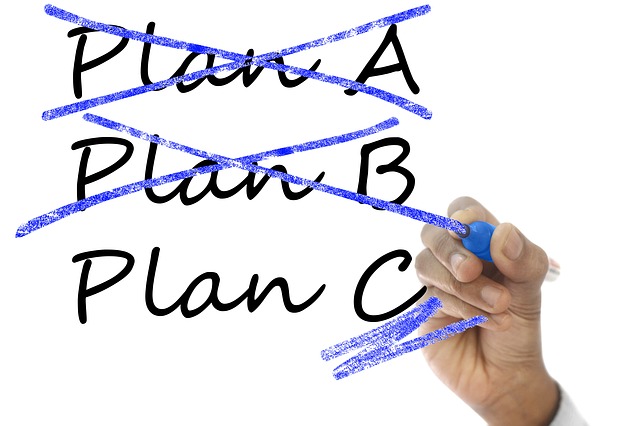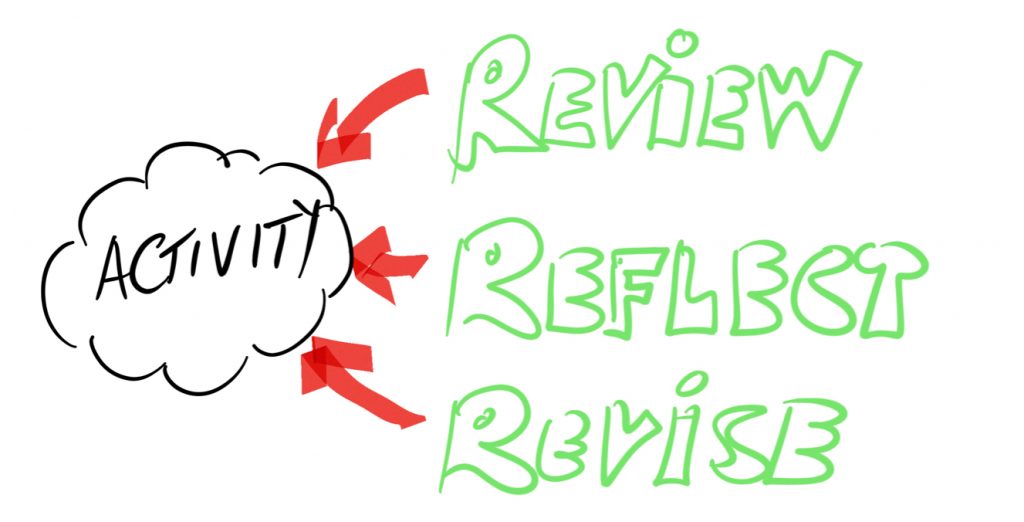
In This Episode…
In yesterday’s episode I shared my process of learning from the experience of procrastination. In this episode I explain how I am experimenting with using the same models to review and reflect on my day and then revise what I do and how I do them.
Edited Transcript
Hi this is Michael Tipper, and welcome to today’s episode of the Profit Productivity Podcast.
Yesterday I talked about how I learned from my experience of procrastinating on that dreadful receipts and invoices task I have to do every quarter. I shared the process I went through in understanding what was going on, and what I eventually put in place to deal with it.
Yesterday I shared two models – the Review, Reflect, Revise model and the Action/Aware/Assess/Adjust model. It doesn’t matter which one I uses, they’re essentially the same thing, just described in slightly different ways.
It doesn’t matter which one I use, because I take a situation and see what works. I keep what does and discard what doesn’t. In applying the principles of theses models to my situation with my business receipts, I identified what needed to change and implemented it.
What I want to do today is talk briefly about how I’m using that on a daily basis.
The context yesterday was a major task I do on a regular basis. I also apply similar principles on a daily basis. Here’s a quick overview of how I manage what I am going to do on a daily basis.
Every night I create a daily plan which looks at the key things I want to achieve tomorrow. I then plan the day working out when I’m going to do each item on my list.
[I’m currently experimenting with different formats. I will go through that in some detail in another episode].
And then what happens? Well, I do my work.
Then at the end of the day, I apply one of the models – let’s use the 3R’s to illustrate this.

When I have finished my working day, I will review my plan to see how things panned out during the day compared to what I had intended to do.
I have a paper plan at the moment. I like it being physical rather than electronic. I like to be able to see it. I like being able to write on it and tick things off. I also use it as a place to capture ideas and thoughts throughout the day.
I’ll review my paper plan and look at the successes and my achievements and I make sure I capture what has worked really, really well. Now it’s important to do this. And the reason for that is because it’s a form of positive reinforcement. When we feel good about the things that we do, when we reward ourselves and recognise those achievements we’re more likely to repeat those behaviours.
Unfortunately I was schooled on making sure I didn’t get anything wrong. If I was given feedback, it always pointed out the things I’d done wrong and that generally made me feel bad. It made me feel like I’d let someone down. Even if I got 8 out of 10, the focus would be on the two I didn’t get right and not the eight I did.
The work I’ve been doing in the leadership development space has shown the power of positive reinforcement is massive. I may be sharing more of that in a future episode. So you reflect on what works, you reward yourself and acknowledge what was good.
Then comes the Revise process of the three Rs. Here I ask myself the question, “What will I do differently next time to make things even better?”
I look where things haven’t quite gone right for me during the day. And then rather than beating myself up about what went wrong, I consider if I were to do that again, what would I do differently?
My effort and my focus is on solutions rather than beating myself up about the problem. I might need to go and do a little bit of analysis to work out why the problem occurred anyway. But once I have done that it’s important to work out what I’m going to do so it doesn’t happen again.
I’m experimenting at the moment with capturing my thoughts either during the day when things happen, versus getting to the end of the night and just doing it from my daily plan. Today I tried capturing things during the day as they happened.
To give you an example,
It’s now 10:15am and my original plan after doing my morning routine and clearing up from breakfast was this:
08:00 – work on some investment paperwork I need to process
09:40 – Video GP appointment to review results of X-rays (don’t worry, nothing serious)
10.00 – Plan, record and publish this podcast episode.
Here’s what actually happened.
- When I got up to make breakfast I realised I didn’t have any eggs. So I walked down the local store nearby to get some which took 10 minutes. I’ve had to do that twice this week already.
- I took an unexpected call from my landlady (which is why I took it) about putting the bins out that ended up lasting 20 minutes.
- When checking my messages and e mail quickly on my phone, I got sucked into watching a music video on Facebook (some US police officers were re-enacting a Bruno Mars Music Video – quite entertaining and I LOVE Uptown Funk!)
- I then took another unexpected call from the Video GP cancelling the call and explaining why which took another 10 minutes.
All of these things interrupted my flow. When I reflect on these, here are some of the revisions to my behaviours I might consider:
Perhaps plan ahead a little more and ensure I get all my food needs for the next few days in one single trip to the supermarket. 10 minutes out of my day to pop to the shops isn’t much, but at the beginning of the day, it interrupted my flow.
I shouldn’t have checked my messages on my phone before I got stuck into the day’s tasks. I wasted about 7 or 8 minutes of my day there. It’s not much but once again my flow was interrupted. Perhaps a better approach is to check for messages later in the morning after I have got my main task underway and progress has been made.
The smartphone is definitely a huge source of interruption because I answered 2 phone calls that took another 25 minutes of my day. Again, not too much, but my flow was interrupted even further. So perhaps I might turn my phone off for the first part of the day and not take any calls.
All this meant it was nearly 9:45am by the time I began to apply myself to the day.
I was then faced with a decision – do I try and catch up on the things I’d planned to do that got interrupted, or do I forget what I’ve not done and get back on track and do what I had planned to do at this time?
I eventually ended up doing the latter which ironically was planning and recording this podcast.
Even that decision raised more questions for me. If I’m able to jump into my plan for the day, does that mean the things that should have been done before are unrelated to the other things I am doing today? If so, does that mean I’m spread across multiple projects?
If I am, maybe I need to focus more. I will go and look across the projects I want to work on and see if I am too thinly spread. Ironically, part of my action plan today was to review my projects and start prioritising them.
Already the experience of the morning has raised a few issues for me as you can see from above. I’m sharing these lessons I’ve learned in the first couple of hours as a way of demonstrating using the review, reflect and revise process.
Not everything is bad because I haven’t considered what went really well. For example, I haven’t mentioned I did my morning routine this morning as usual and got into a good state before all the interruptions started.
However the key message here is, this early on in the day, I’m missing a couple of hours of focused effort of my working day.
Later on I will capture those reflections in my journal and then tonight when I do my plan for tomorrow, I will incorporate some of those lessons in the way I do things.
Some of them will be small shifts I’ll make immediately. Some of them will just be captured as ideas I’ll implement at later date. But what I’ve got by doing this is my finger on the pulse about the way I’m doing things.
You might think I’m being a little bit too detailed. However that is my nature and where I excel. It is also necessary because at the moment, I am fine tuning my productivity and it needs this level of effort and rigour.
It needs this level of scrutiny to be able to get me to the point where I can perform at a high level doing the things I want to achieve. It’s part of the growth that I need to go through.
In summary then:
I use the Review, Reflect, Revise process on a daily basis.
The two questions I ask myself at the end of the day is are “What worked really well?” (reinforcing what I’ve done well) and “What would I do differently to make it even better next time?”
I’m doing this on a daily basis and slowly but surely, I’m chipping away at the areas where I’ve lacked discipline or I’ve lacked due process. Slowly but surely, I’m adjusting and moving towards a much better place.
The cumulative effect over just the last four or five weeks I’ve been doing this with this level of intensity has been quite dramatic. If I continue this over the next three months, that’s going to be even more so.
I Hope that’s been of use to you .
Until tomorrow…..